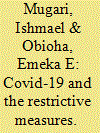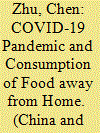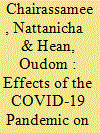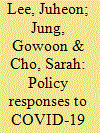|
|
|
Sort Order |
|
|
|
Items / Page
|
|
|
|
|
|
|
| Srl | Item |
| 1 |
ID:
182833


|
|
|
|
|
| Summary/Abstract |
The post-Arab Spring period witnessed the outbreak of devastating civil wars in Syria, Libya and Yemen. These wars had many disastrous impacts on these countries, which threatened their existence as political entities. The Covid-19 pandemic exacerbated the problems facing these countries, especially in light of the collapse of their infrastructure and health care systems. In spite of this, the pandemic and its consequences did not mitigate these civil wars. In this context, this article aims to answer the following question: Why do civil wars continue in the Arab world, despite the Covid-19 pandemic and its disastrous consequences? In other words, why didn't the pandemic create a new dynamic that pushes for the settlement of the civil wars in Syria, Libya and Yemen?
The article provides five reasons to explain this phenomenon. First, the worsening situation in Syria, Libya, and Yemen before the emergence of the Covid-19 pandemic, due to civil wars in these countries turning into protracted conflicts. Second, the nature of the civil wars as proxy wars, due to the large number of regional and international actors that have been involved in each of them. Third, the expansion of war economies in these countries; this phenomenon feeds civil conflict and sustains it. Fourth, the disintegration of the nation state in Syria, Libya, and Yemen, due to the absence of a strong central government, and the multiplicity of actors that control the state's territory. Fifth, the inefficiency of the means to peacefully settle Arab civil wars, mainly through the political efforts of the United Nations.
|
|
|
|
|
|
|
|
|
|
|
|
|
|
|
|
| 2 |
ID:
182437


|
|
|
|
|
| Summary/Abstract |
The emergence of the COVID-19 pandemic at the onset of the year 2020 brought unprecedented suffering to humanity. Economic activities in virtually all nations across the globe were brought to a shuddering halt, with the third world suffering the worst effects on the economic front. The health security of nations across the globe was shaken, as nations came to terms with the surging health needs for the infected citizens. In order to grapple with the pandemic, nations took drastic measures, chief among them being the implementation of lockdowns, coupled with harsh restrictions. These measures, however, came at a cost. This paper explores the impacts of the restrictive measures that were implemented by the Zimbabwean government to combat COVID-19 pandemic. The paper interrogates these measures in the context of the national security discourse. In the analysis, the paper also makes reference to South Africa- a more developed nation and Zimbabwe’s neighbour.
|
|
|
|
|
|
|
|
|
|
|
|
|
|
|
|
| 3 |
ID:
182580


|
|
|
|
|
| Summary/Abstract |
This article investigates how the COVID-19 pandemic and related public health measures affected the consumption of food away from home (FAFH) among Chinese consumers. We obtained access to the complete sales records from a major restaurant chain in China, for 111 sites located in 12 cities, covering over 5.6 million high-frequency dining transactions made between 1 January 2019 and 31 December 2020. By applying a high-dimensional fixed-effects model, we found that, on average, consumers spent more and ordered more calories (as well as carbohydrates, protein, fat, and sodium) after the COVID-19 outbreak than in the pre-COVID-19 period. Our results do not support the hypothesis that COVID-19 led to healthier eating behaviors during and after the pandemic. Our results underline the importance of nutrition education and awareness programs to mitigate unhealthy eating habits generated by the pandemic and of the continued role of FAFH after the pandemic.
|
|
|
|
|
|
|
|
|
|
|
|
|
|
|
|
| 4 |
ID:
188449


|
|
|
|
|
| Summary/Abstract |
This study aims to explore the labour market in Thailand during the COVID-19 era. By using individual data from the National Statistical Office of Thailand, we estimate the probability of a worker becoming unemployed and being temporarily absent from work. The results demonstrate that the pandemic could cause a higher chance of being unemployed for younger workers. However, the chance of being temporarily absent from work increased for older and less-educated workers. Each sector was affected differently by the pandemic. Workers in large firms were more likely to be unemployed, suggesting that the pandemic disproportionately affected large firms, compared to micro, small or medium-sized enterprises.
|
|
|
|
|
|
|
|
|
|
|
|
|
|
|
|
| 5 |
ID:
181035


|
|
|
|
|
| Summary/Abstract |
While South Korean racism and discrimination against migrant workers and foreign brides are not new phenomenon, some early policies adopted by the central and local governments to mitigate the impact of Covid-19 have once again revealed the country’s deep-seated xenophobia. This paper focuses on three government policies – mask rationing, universal disaster relief funds, and local government subsidies – that were adopted during the first wave of coronavirus in South Korea from February until June 2020, when supplies were insufficient and the economy was most severely affected. This paper highlights the fact that government policies were based on nationality, which led to the exclusion of foreign nationals, even long-time taxpaying residents. Such institutional discrimination was blatant, considering the country’s decades-long discussion of multiculturalism. This paper points out that, as a country with a very low number of naturalized citizens, discrimination against foreign nationals not only reflects South Korea’s perceived boundaries of in-groups and out-groups, but also demonstrates the lack of a legal basis that prohibits discriminatory practices.
|
|
|
|
|
|
|
|
|
|
|
|
|
|
|
|
|
|
|
|
|